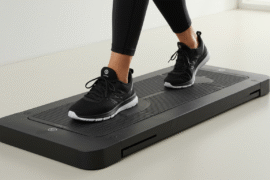This article may contain references to products or services from one or more of our advertisers or partners. We may receive compensation when you click on links to those products or services. Nonetheless, our opinions are our own.
The information presented in this article is accurate to the best of our knowledge at the time of publication. However, information is subject to change, and no guarantees are made about the continued accuracy or completeness of this content after its publication date.
It is expected to put your health and well-being first as you deal with the challenges of midlife. You might be focusing on fitness routines, dietary choices, and mental sharpness, all while juggling work, family, and personal aspirations. However, an essential aspect of health often goes unnoticed—the type of body fat you carry. Recent research has unveiled a concerning link between certain types of body fat in mid-life and the risk of developing Alzheimer’s disease later on. Understanding this connection is vital, as it offers insights into how lifestyle choices today can impact your cognitive health tomorrow. We’ll dive into the science behind this correlation, how you can mitigate risks, and how your body composition plays a pivotal role in your overall brain health.
- Understanding the Connection Between Body Fat and Cognitive Health
- Recognizing the Specific Type of Fat Linked to Alzheimer’s
- Evaluating Your Body Composition: Steps to Get Started
- Practical Lifestyle Changes to Reduce Risk Factors
- Seeking Professional Guidance: When and How to Get Help
- Recommended Reads
Understanding the Connection Between Body Fat and Cognitive Health
Your body fat composition is not just a matter of aesthetics; it has profound implications for your brain health, especially as you transition into mid-life. Research indicates that excess visceral fat, often referred to as “belly fat,” can significantly increase your risk for cognitive decline and diseases such as Alzheimer’s. This type of fat surrounds your internal organs and is linked to inflammation, which can negatively impact brain function over time.
It’s essential to recognize the signs and implications of this connection:
Inflammation and Cognitive Function
Chronic inflammation can disrupt neuronal communication, impairing memory and learning.
Metabolic Health
Increased visceral fat is often correlated with insulin resistance, which may exacerbate neurodegenerative processes.
Age and Hormonal Changes
Hormonal shifts can influence fat distribution as we age, making it crucial to monitor changes in body composition.
To better understand the implications, take a look at the following table that outlines the types of body fat and their potential impacts on cognitive health:
| Type of Body Fat | Impact on Cognitive Health |
|---|---|
| Visceral Fat | Increased risk of Alzheimer’s, inflammation |
| Subcutaneous Fat | Generally harmless; less linked to cognitive decline |
| Lean Muscle | Protective against cognitive decline, promotes metabolic health |
Recognizing these connections empowers you to take actionable steps toward improving your physical appearance and cognitive health. Regular exercise, a balanced diet, and monitoring your body composition can cultivate a healthier lifestyle that supports your brain well into your later years.
Recognizing the Specific Type of Fat Linked to Alzheimer’s
Many people aren’t aware that the fat accumulating around their abdomen—known as visceral fat—isn’t just an aesthetic concern; it could drastically impact cognitive health. This particular type of fat is more metabolically active than subcutaneous fat, which can influence hormone levels and inflammation, which play critical roles in brain health. If you carry extra pounds around the belly, it may be time to reconsider your lifestyle and dietary habits.
A closer look at how visceral fat operates reveals its potential threat to cognitive function:
- Inflammation: Visceral fat releases inflammatory cytokines that can affect brain health.
- Hormonal Changes: This type of fat alters the balance of hormones, potentially leading to metabolic syndrome.
- Blood Sugar Levels: High visceral fat levels are associated with insulin resistance, a risk factor for Alzheimer’s disease.
To maintain a competitive edge, prioritize nutrition and consistent physical activity. Empower yourself with knowledge about healthy eating and engage in physical exercises that boost metabolism and promote fat loss. By making these changes, you can improve your body composition and cognitive health as you age.
Voted "Best Overall Budgeting App" by Forbes and WSJ
Monarch Money helps you budget, track spending, set goals, and plan your financial future—all in one app.
Get 50% OFF your first year with code MONARCHVIP
Evaluating Your Body Composition: Steps to Get Started
Understanding your body composition is essential, especially as you navigate your health in mid-life. To start, assess your body fat percentage, as this can provide insight into your overall health and risks, such as potential cognitive decline associated with certain types of body fat. Here are a few steps to help you in this process:
- Measure Your Weight: Use a reliable scale to record your weight.
- Calculate Your Body Fat Percentage: You can use calipers to measure skinfold thickness or invest in a smart scale that estimates body fat using bioelectrical impedance.
- Track Your Measurements: Keep records of your waist, hip, and neck measurements, as these can help paint a fuller picture of your composition.
- Evaluate Your Diet and Activity: Reflect on your eating habits and exercise routine; these factors significantly influence your body fat levels.
Once you’ve gathered this information, you can identify whether you are carrying excess visceral fat, often linked to various health issues, including Alzheimer’s. It’s valuable to know the type of fat you have. Here’s a simple table to help categorize your body fat percentage based on gender and age:
| Gender | Age Group | Healthy Body Fat (%) |
| Male | 40-59 | 11-21 |
| Female | 40-59 | 23-33 |
By evaluating these factors, you’re not just seeking numbers but embarking on a journey toward a healthier you. As you age, taking actionable steps today can lead to improved physical health and greater cognitive well-being.
Practical Lifestyle Changes to Reduce Risk Factors
Making small, manageable lifestyle changes can go a long way in reducing risk factors associated with the type of body fat linked to Alzheimer’s. Focusing on a balanced diet is a great start. Here are some practical ways to improve your eating habits:
- Incorporate more fruits and vegetables: Aim for a colorful plate filled with various produce to boost your intake of antioxidants and essential nutrients.
- Opt for whole grains: To enhance fiber intake, replace refined carbohydrates with whole grains like quinoa, brown rice, and whole wheat bread.
- Choose healthy fats: Include sources of omega-3 fatty acids, such as salmon, walnuts, and flaxseeds, which support brain health.
Physical activity is equally important. Engaging in regular exercise not only helps in managing weight but also promotes overall brain health. Consider these activities:
- Walking or jogging: A daily 30-minute walk provides significant cardiovascular benefits.
- Strength training: Incorporating resistance exercises at least twice weekly helps build muscle and boost metabolism.
- Mind-body exercises: Practices like yoga or tai chi help reduce stress and improve mental clarity.
By making these adjustments to your diet and physical activity, you can create a healthier lifestyle that supports both your body and brain. You can also take proactive steps to mitigate risks associated with body fat and cognitive decline.
Seeking Professional Guidance: When and How to Get Help
Your health journey is unique, and recognizing when to seek professional guidance can profoundly impact your well-being, especially in mid-life. If you find yourself experiencing noticeable changes in body fat distribution, particularly around the abdomen, or if you have concerns about cognitive function, consider reaching out for help. Consult with:
- Your Primary Care Physician: They can guide you through initial assessments and refer you to specialists if necessary.
- Nutritional Experts: A registered dietitian can help tailor your dietary choices to manage body fat and enhance cognitive health.
- Fitness Trainers: Engaging with a professional can provide structured workout plans that cater to your body’s needs.
- Psychologists or Counselors: Addressing mental health is as crucial as physical health in your wellness journey.
Understanding how specific types of body fat correlate with health outcomes, including Alzheimer’s, is vital. Don’t hesitate to engage with medical practitioners who can offer personalized guidance or refer you to valuable resources. Knowing when to seek help can empower you to safeguard your health proactively.

Reviewed and edited by Albert Fang.
See a typo or want to suggest an edit/revision to the content? Use the contact us form to provide feedback.
At FangWallet, we value editorial integrity and open collaboration in curating quality content for readers to enjoy. Much appreciated for the assist.
Did you like our article and find it insightful? We encourage sharing the article link with family and friends to benefit as well - better yet, sharing on social media. Thank you for the support! 🍉
Article Title: Having This Type of Body Fat in Mid-Life Is Linked to Alzheimer’s
https://fangwallet.com/2025/03/17/having-this-type-of-body-fat-in-mid-life-is-linked-to-alzheimers/The FangWallet Promise
FangWallet is an editorially independent resource - founded on breaking down challenging financial concepts for anyone to understand since 2014. While we adhere to editorial integrity, note that this post may contain references to products from our partners.
The FangWallet promise is always to have your best interest in mind and be transparent and honest about the financial picture.
Become an Insider

Subscribe to get a free daily budget planner printable to help get your money on track!
Make passive money the right way. No spam.
Editorial Disclaimer: The editorial content on this page is not provided by any of the companies mentioned. The opinions expressed here are the author's alone.
The content of this website is for informational purposes only and does not represent investment advice, or an offer or solicitation to buy or sell any security, investment, or product. Investors are encouraged to do their own due diligence, and, if necessary, consult professional advising before making any investment decisions. Investing involves a high degree of risk, and financial losses may occur including the potential loss of principal.
Source Citation References:
+ Inspo
There are no additional citations or references to note for this article at this time.











































